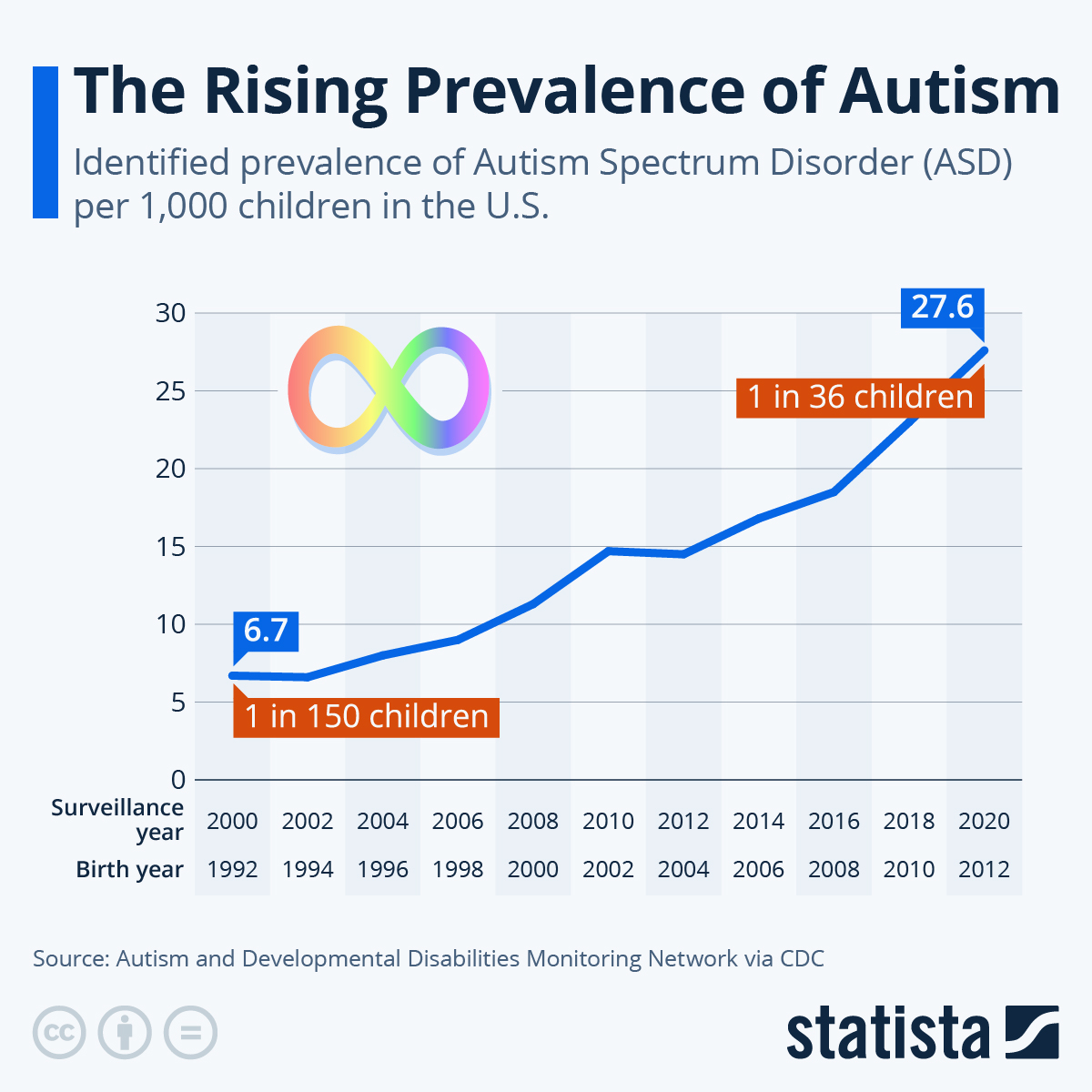Adult ADHD: Examining Higher Rates In Individuals With Autism And Intellectual Disabilities

Table of Contents
The Complex Relationship Between Adult ADHD, Autism, and Intellectual Disabilities
The overlapping symptoms of Adult ADHD, autism, and intellectual disabilities often make diagnosis extremely challenging. These conditions frequently mask or exacerbate one another, creating a complex clinical picture. For example, inattention, a core symptom of ADHD, can also be a characteristic of autism or ID, making it difficult to isolate the contribution of ADHD alone. Similarly, impulsivity and difficulties with social interaction, common in ADHD, are also prevalent in autism.
-
Overlapping Symptoms: The shared symptoms create diagnostic ambiguity. Inattention, impulsivity, hyperactivity, difficulty with organization, and challenges with social communication and interaction are common across all three conditions. This overlap can lead to misdiagnosis or delayed diagnosis of one or more conditions.
-
Challenges in Accurate Diagnosis: The blurred lines between these conditions require a multifaceted approach to diagnosis. A single assessment may not be sufficient to accurately determine the presence and severity of each condition.
-
Impact of Comorbidity: The presence of multiple conditions often results in a more severe presentation of symptoms. For instance, ADHD symptoms might be amplified in an individual with autism, leading to heightened challenges in daily functioning.
-
Comprehensive Assessment: Accurate diagnosis demands a thorough assessment by a multidisciplinary team. This team might include psychiatrists, psychologists, neuropsychologists, and occupational therapists, each bringing a unique perspective to the evaluation.
Diagnostic Challenges and Considerations for Adult ADHD in Individuals with Autism and Intellectual Disabilities
Diagnosing Adult ADHD in individuals with autism and intellectual disabilities poses unique challenges. These challenges stem from communication difficulties, the need for alternative assessment methods, and the careful differentiation between symptoms arising from each condition.
-
Difficulties in Self-Reporting: Individuals with autism or intellectual disabilities may struggle to accurately self-report symptoms, relying instead on observational data and reports from caregivers or other significant individuals in their lives.
-
Behavioral Observations: Clinicians must rely heavily on behavioral observations to assess symptoms. This may involve observing the individual in various settings, such as at home, at work, or in social situations.
-
Adapting Assessment Tools: Standard ADHD assessment tools may need modification to accommodate the specific communication and cognitive abilities of individuals with autism or intellectual disabilities.
-
The Role of Neuropsychological Testing: Neuropsychological testing can provide valuable insights into cognitive functioning and help differentiate between ADHD and other conditions.
-
Differentiating ADHD Symptoms: Careful clinical judgment is essential to distinguish ADHD symptoms from symptoms associated with autism or intellectual disability. This requires extensive knowledge of all three conditions and their varied presentations.
Impact of Comorbid Adult ADHD on Daily Functioning
The presence of Adult ADHD alongside autism or intellectual disabilities significantly impacts daily life, leading to increased difficulties across multiple domains. Untreated ADHD exacerbates existing challenges, leading to a decline in overall quality of life.
-
Challenges in Employment and Education: Individuals may struggle with maintaining employment, completing educational tasks, and managing their time effectively. This can lead to unemployment, underemployment, and academic difficulties.
-
Difficulties in Social Relationships and Maintaining Independence: Social interactions can be more challenging, potentially leading to social isolation and difficulties with forming and maintaining relationships. Independence in daily living may also be significantly impaired.
-
Increased Risk of Anxiety, Depression, and Other Mental Health Issues: The cumulative effects of multiple conditions can increase the risk of developing anxiety, depression, and other co-occurring mental health issues.
-
Impact on Self-Esteem and Overall Quality of Life: The persistent challenges associated with these comorbid conditions can negatively impact self-esteem and overall quality of life, leading to feelings of frustration, inadequacy, and low self-worth.
-
The Importance of Early Intervention and Support: Early identification and intervention are crucial to mitigating the negative impact of these conditions and improving outcomes.
Treatment Approaches for Adult ADHD with Co-occurring Autism and Intellectual Disabilities
Effective treatment for Adult ADHD in individuals with autism and intellectual disabilities requires a holistic approach. This approach incorporates medication, various therapeutic interventions, and supportive services, tailored to the specific needs and characteristics of each individual.
-
Medication Management: Stimulant and non-stimulant medications may be considered, with careful monitoring for potential side effects and adjustments based on individual responses.
-
Behavioral Therapies: Behavioral therapies, such as parent training, behavioral modification strategies, and executive function training, can help manage impulsivity, inattention, and improve organizational skills.
-
Cognitive Behavioral Therapy (CBT) and Other Relevant Therapies: CBT and other therapeutic approaches can address co-occurring mental health issues, such as anxiety and depression, and help individuals develop coping mechanisms.
-
Educational and Vocational Support Services: Support services tailored to the individual's specific needs are crucial for educational and vocational success. This might include specialized educational programs, job coaching, and workplace accommodations.
-
Social Skills Training: Social skills training can help individuals improve their social interaction skills, building confidence and reducing social isolation.
-
Support Groups and Peer Support: Support groups provide a sense of community and shared understanding, allowing individuals to connect with others facing similar challenges.
Conclusion
The higher prevalence of Adult ADHD in adults with autism and intellectual disabilities highlights a significant clinical challenge. The overlapping symptoms create diagnostic difficulties, emphasizing the need for comprehensive assessment involving multiple professionals. Furthermore, the impact of comorbid Adult ADHD on daily functioning underscores the critical role of tailored interventions. Treatment should be holistic, encompassing medication management, various therapies, and supportive services. Untreated Adult ADHD can significantly worsen the challenges associated with autism and intellectual disabilities, impacting quality of life. If you suspect Adult ADHD in yourself or a loved one, particularly when co-occurring with autism or intellectual disabilities, seek professional help immediately. Early diagnosis and intervention are key to improving outcomes and quality of life. Let's continue to promote research and raise awareness about Adult ADHD and its complex relationship with autism and intellectual disabilities to ensure appropriate support and effective treatment strategies are available to those who need them. Find resources and qualified professionals specializing in these conditions through your local mental health services or online directories.

Featured Posts
-
 Cardinals Conviction And Papal Conclave Voting Rights
Apr 29, 2025
Cardinals Conviction And Papal Conclave Voting Rights
Apr 29, 2025 -
 Downtown Louisville Evacuation Firefighters Respond To Gas Leak
Apr 29, 2025
Downtown Louisville Evacuation Firefighters Respond To Gas Leak
Apr 29, 2025 -
 Bundesliga Abstiegskampf Jancker In Klagenfurt Droht Ein Trainerwechsel
Apr 29, 2025
Bundesliga Abstiegskampf Jancker In Klagenfurt Droht Ein Trainerwechsel
Apr 29, 2025 -
 Effective Natural Strategies For Adhd Symptom Relief
Apr 29, 2025
Effective Natural Strategies For Adhd Symptom Relief
Apr 29, 2025 -
 Mwedna Me Fn Abwzby 19 Nwfmbr
Apr 29, 2025
Mwedna Me Fn Abwzby 19 Nwfmbr
Apr 29, 2025
